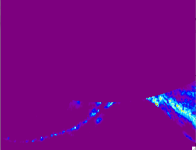Hi WRF community,
I'm in the early stages of a project to run WRF using ERA5 reanalysis data, ultimately over a two-way nested domain (12 km and 4 km spatial resolution). Right now my test runs (run_hours = 21) have all finished fine, but once I extend the runs I encounter segmentation faults.
The last messages from rsl.error on the relevant core that segfaults (with debugging set to 200, and only running the outer domain) ... seems to be getting stuck in the spam filter here, so I am attaching it.
The segfault always occurs after "CALL rrtmg_lw". It usually occurs right after the midnight UTC timestamp has rolled around, but occasionally it has happened at another timestep. Also, I am using adaptive time steps here, but the behavior is identical with fixed time step (72 = 6 times dx, and same with time_step = 60).
I initially suspected a change I made to METGRID.TBL to cap snow fields (SNOW variable from SD variable in ERA5), but this last segfault occurs after I switched back and regenerated all met_em files .
Attached namelist.input and namelist.wps. (Note that I pre-generated three days' worth of met_em files for both domains. This has not made a difference in the past, but if you advise so I can generate the met_em files for the exact same test run that I run WRF on later.)
Any help is greatly appreciated - I'm a bit stuck here.
I'm in the early stages of a project to run WRF using ERA5 reanalysis data, ultimately over a two-way nested domain (12 km and 4 km spatial resolution). Right now my test runs (run_hours = 21) have all finished fine, but once I extend the runs I encounter segmentation faults.
The last messages from rsl.error on the relevant core that segfaults (with debugging set to 200, and only running the outer domain) ... seems to be getting stuck in the spam filter here, so I am attaching it.
The segfault always occurs after "CALL rrtmg_lw". It usually occurs right after the midnight UTC timestamp has rolled around, but occasionally it has happened at another timestep. Also, I am using adaptive time steps here, but the behavior is identical with fixed time step (72 = 6 times dx, and same with time_step = 60).
I initially suspected a change I made to METGRID.TBL to cap snow fields (SNOW variable from SD variable in ERA5), but this last segfault occurs after I switched back and regenerated all met_em files .
Attached namelist.input and namelist.wps. (Note that I pre-generated three days' worth of met_em files for both domains. This has not made a difference in the past, but if you advise so I can generate the met_em files for the exact same test run that I run WRF on later.)
Any help is greatly appreciated - I'm a bit stuck here.

